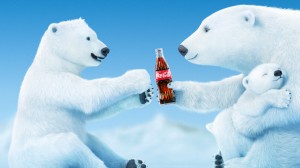Coca-Cola is one of the most recognized brands worldwide.
Market share driven, global food and soft drink companies have been expanding their market to third world countries and exploiting their poor and uneducated population living often on $2 a day as affluent western markets have become saturated. In these countries, a kilo of fresh vegetables often costs more than a 2 litter bottle of coke. Like other multinational companies, Coca-Cola has been criticized for its negative impact on the young market in those countries. It is often associated with affecting eating habits and leading to a loss of local cultures. It is imposing its own culture: the American dream! It sells the idea of a land of opportunity where everyone is equal and everything is possible, through slogan like: America’s Real Choice, Life Tastes Good…
But as we know these large corporations are able to make a positive impact in the world. We all know Coca-Cola’s engagement in saving the polar bears from global warming. Well, the Coca-Cola Company has also partnered in 2012 with Deka R&D to address clean water issues in developing nations. The goal is to offset 100 percent of the water it uses in the production of its beverages in those countries by 2020. Impressive and ambitious, you would say! How is it going to achieve its goal? Dean Kamen, the inventor of the Segway scooter, has invented a vapor –compression distillation system, Slingshot. It boils and evaporates any dirty water such as river water, ocean water or sewage water. With one kilowatt of electricity the Slingshot can creates 10 gallons of water. It can also run on renewable energy. In 2011, the system has already been tested in 5 schools in Ghana, providing clean drinking water to 1,500 school children!
A nice gesture or another marketing strategy? It is still a step in the right direction for many developing or third world countries where fresh clean water is already a luxury!
